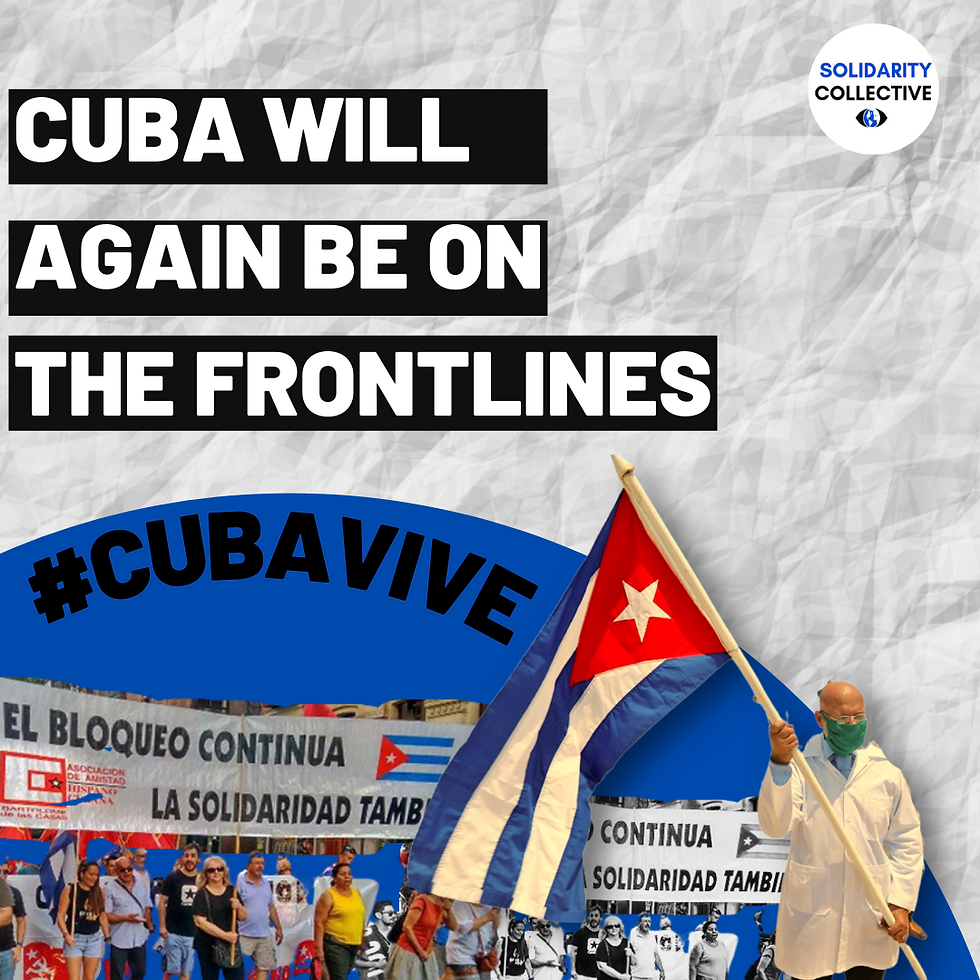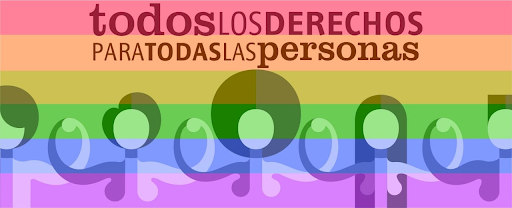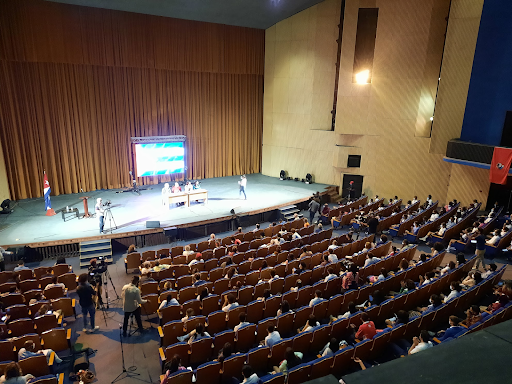Cuba Will Again Be On The Frontlines #CubaVive
- Evan King
- Dec 31, 2021
- 5 min read

By Cuba Team
As this difficult year comes to a close, here's another round-up of Cuba-related readings, news, and events. We look forward to spending next year keeping connected through emails, statements, virtual events, actions, and delegations. There is plenty to be motivated by. The 1st of January makes 63 years since the 1959 triumph of the Cuban Revolution and we believe that the U.S. Blockade, the military occupation of Guantanamo Bay, and interventionist policies can and will be ended!
Updates on U.S. Congress and Policy
There have been major setbacks. Over a year into his administration, Biden has not kept his electoral promise to revert back to Obama-era policy. He has not repealed the 243 devastating sanctions imposed under Trump that include a ban on remittances, major restrictions on where U.S. citizens can stay and do business in Cuba, the annulation of flights to provinces other than Havana, bans on the purchase of cigars and rum by US citizens, and the pulling of staff from the U.S. embassy in Havana. When asked about where the U.S. stands regarding his policy review, Juan Gonzalez, the National Security Council’s Senior Director for the Western Hemisphere replied that “After July 11, [the Biden Administration] hit the pause button... There’s a rule before July 11 and after July 11”. It is a cruel irony that the U.S. uses “humanitarianism” as the reason for imposing immeasurably harmful policies to the Cuban people and their Caribbean process. For those of us trying to build international solidarity, the manipulation of street protests with "intervention for democracy" rhetoric is an unfortunate lesson in the need for our social movements’ to unequivocally reject U.S. sanctions against the Global South.
A very important victory! 114 members of Congress, more than half of House Democrats, signed a “Dear Colleague” letter circulated by the offices of Representatives James P. McGovern (D-MA), Barbara Lee (D-CA), and Gregory Meeks (D-NY) sent to President Joe Biden’s office on December 17th, the 7th anniversary of the historic re-engagement between the U.S. and Cuba begun in 2014 under the Obama Administration. Thank you for keeping the organising energy that made that rapprochement possible, and for making calls to your Reps, writing, telling your community, and supporting this recent achievement! You can read the press release from ACERE here and the original letter here.
Despite this congressional and the grassroots stance (including fantastic city and labour Saving Lives Campaign Resolutions that represent tens of millions), the U.S. State Department then announced that the U.S. will no longer provide “non humanitarian, non trade-related assistance” and will vote against Cuba receiving international loans. They claim that these restrictions are in response to U.S.' concerns about human trafficking and forced labour. Cuba’s Minister of Foreign Affairs Bruno Rodriguez, denounced the memorandum, writing “The US tries to justify the measures of abuse and aggression against the Cuban population with lies.” In November, Cuba’s Minister of Justice Oscar Silvera Martínez insisted that Cuba is dedicated to eradicating these types of abuses, citing Cuba’s national report on human trafficking published every year since 2013. Martínez argued that Cuba’s inclusion in the U.S. State Department’s Trafficking in Persons report is motivated by “entirely political reasons”. Nicaragua and North Korea are among other heavily-sanctioned countries cited.
Updates from Cuba
Good news in efforts to subvert patriarchy! The 23rd and Final Draft of the new Family Code was unanimously approved by Cuban Parliament and will be reviewed through popular consultation between February 1st and April 30th. The Centro Memorial Martin Luther King Jr. played a central role in the grassroots popular education, debate, and participatory process, their fight challenges rising rightwing religious fundamentalism. You can watch one of their many workshops and presentations regarding their #HastaQueElAmorSeaLey and #TodosLosDerechosParaTodasLasPersonas campaigns here.
Additional political, economic, monetary, and labour rights have been affirmed for working mothers and parents, especially those who are pregnant, breastfeeding, caring for an unwell child, studying, and working; and, for children within a multi-child household, and for those who have special educational needs.

Earlier this month, members of the CMMLK attended a youth-centered gathering with liberation theologian, activist, and author Frei Betto. Hundreds of youth, almost all of them under 30, listened to his brief presentation and presented their own reflections and questions on the role of young people. The CMMLK’s Marilín Peña Peréz’s introductory speech named the tens of youth organisations, unions, groups, and schools present.
The conversation was moderated by Karla Santa, university student and the national president of la Federación Estudiantil Universitaria (F.E.U.). Betto shared stories about writing Fidel and Religion in the 1980s, and lamented the dire situation that Latin America and the Caribbean face from neoliberal and fascist assaults on the poor. He celebrated the achievements of Cuba, put them in historical context, and encouraged joy and pride - something that has been difficult for Cuban youth in these tough years of pandemic and Blockade and the desperation they've caused. Betto reminded us that youth are the protagonists in Global South revolutionary history (“not a single revolutionary we know and admire began their political work after they were 30”). Betto called for hope as a life-affirming and necessary practice. He named that Cuba's achievements in collective rights and internationalism are tangible motivations that another world is possible.

The Summit for Democracy hosted by the Biden Administration illuminated the violent distrust the U.S. has for Latin America and the Caribbean's people, Global South sovereignty, and for Black, Indigenous, and campesine unity. The language is reminiscent of the ways in which the elite use lies to misrepresent colonisation and other racist, misogynist, and anti-worker agendas into supposedly benevolent programmes. Cuba has provided an alternative model, championing anti-colonial causes and symbolic and concrete solidarity with the oppressed.
Radio Habana Cuba recently conducted this timely interview, “Cuban People Ask: The US Authority has the authority to speak of Human Rights?” with Johana Tablada, Deputy Director of the U.S. office of the Cuban Foreign Ministry. She discusses the U.S. mis-use of “human rights” and “democracy” to further carry out contrary, interventionist policy, to justify war and U.S. hegemony. Meanwhile Latin America and the Caribbean organise for multi-polarity and integration.
Cuba Solidarity Actions
Last week, activists carried out solidarity vigils at airports around the U.S. to express support for ending the Blockade. (They noted that the right to carry out actions at airports was won by airline worker unions.) You can read about these actions in New York, Miami, and Los Angeles written by participants here. Activists in other cities such as Barcelona, Vancouver, Winnipeg, Rome, and Albany also participated in airport vigils.

In response to the Biden Administration’s Summit for Democracy, caravanistas from IFCO/Pastor for Peace’s 31st Annual Friendshipment recorded the following video on what human rights mean to them and to denounce U.S. imperialism. Last month, the Black-led multi-generational and multi-racial group travelled to Cuba from many states across the U.S. The Centro Memorial Martin Luther King Jr. hosted them in La Habana and Matanzas where they met with leaders from a range of fields. They brought 3 tons of medicine and food donations raised by the many who want to replicate Cuba’s model of solidarity. We were excited to sit down with some of the caravanistas and were inspired by their commitment to solidarity in action.
A new documentary “Cuba’s Life Task”, focuses on the country's climate change mitigation and adaptation efforts and the Cuban government’s State Plan to Confront Climate Change (Tarea Vida) using participatory planning, natural solutions, and environmental science. Cuba is a Caribbean island, and much like its neighbours and other majority-island and coastal regions (like the Pacific), they feel the most life-threatening brunt of climate disasters, right now. The film can be rented for $7 here (it seems likely that the film will soon be up for free on Youtube) and the trailer can be seen here.

There is always much more to share - the CMMLK's transnational programming desde abajo, the role of Cuba in the Colombia peace process, the internationalisation of the Cuban vaccination programmes, the long list of solidarity actions you can take from petitions to congressional lobbying to educational events to food donations to resolutions to delegations and social and other media campaigns. Please get in touch with us!
With strength and solidarity from Havana,
Justin and Pambana



Comments